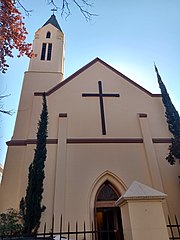
The Lutheran Church in Chile (Iglesia Luterana en Chile, ILCH) is one of the two denominations of Lutheranism in Chile. It separated from the historical Evangelical Lutheran Church in Chile (IELCH) in 1975 due to differences in political perceptions of the pastors and bishops during the beginning of the military dictatorship led by Augusto Pinochet. It is a member of the Lutheran World Federation, which it joined in 1991. Most congregations are bilingual in German and Spanish.
